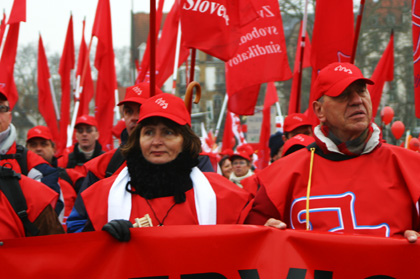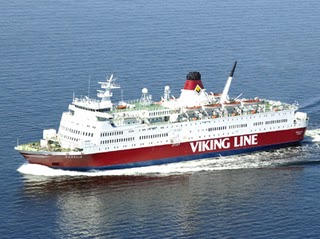Democrat - July-August 2010
EU smuggles in global
social dumping
by
Brian Denny & Linda Kaucher
EU smuggles in global social dumping
by Brian Denny & Linda Kaucher
The EU is currently negotiating trade agreements that include provisions
to allow transnational corporations (TNCs) to bring in their own
labour in a process known as Mode 4, hugely increasing the threat
of social dumping.
Mode 4 is cross border services trade in which workers are actually
moved across borders. Its inclusion in the international trade agenda
allows transnational corporations (TNCs) to profit from the cross
border wage differentials, national insurance exemptions, tax juggling
and other benefits of 'flexible labour'.

Trade unioinsts demonstrating against social dumping in Slovenia
This undermines workers' abilities to maintain wages and conditions,
loading the balance of power between labour and capital in favour
of TNCs. It also reduces EU member states' democratic rights to
control their own migration policies, in effect handing that power
to TNCs.
As labour standards are lost in the few places they have been achieved,
such as in some EU countries, it will become more difficult for
workers elsewhere ever to achieve them.
Mode 4 is included in all of the trade agreements the EU is negotiating.
It is a particularly secret part of the trade agenda, kept from
those who will be negatively affected.
These EU offers on Mode 4 are without quotas or Economic Means Tests
(ENT).
Defenders of Mode 4 argue that it is not immigration but temporary
labour movement - yet this does not lessen the detrimental effects
on EU workers of an influx of temporary workers who will be prohibited
from becoming unionised.
Once signed up, Mode 4 openings, like all trade commitments, become
effectively permanent, due to the prohibitive cost of withdrawal.
Current EU 'investor protection' proposals increase this penalty,
allowing not just other states but transnational corporations to
challenge a country's failure to fulfil its trade commitments. Successful
challenges will lead to prohibitive financial compensation claims
for the loss of all potential profits, called 'expropriation'.
So when workers feel the effects of the Mode 4 commitments that
have been made on their behalf, it will be too late to reverse them.
India, on behalf of its TNCs such as steel giant Tata, is demanding
TNC Mode 4 access to the EU, and an EU/India Free Trade agreement
is currently being fast tracked.
A recent report on the ongoing EU-India Free Trade Agreement (FTA)
negotiations said the "full ambition of the FTA can not be
achieved without Mode 4 - which currently faces a range of barriers
like wage-parity conditions".
From the other side, the EU is demanding very significant investment
concessions, including banking liberalisation. The indications are,
therefore, that the movement of 'intracorporate transferees' (ICTs)
will be used broadly, and with high expectations of megaprofits.
But bringing Indian workers into the EU displaces local workers
and undermines established working conditions. A race to the bottom
is inevitable across many sectors, as TNCs can bring in workers
in whatever areas they are established, plus offer cheap, onshore
outsourcing.
The Indian government is arguing that the minimum wage stipulations
of EU member states undermine its cheap labour 'comparative advantage'.
Yet even if minimum wage levels are maintained, wage competition
for just the minimum wage represents intense downward pressure on
labour standards for skilled EU workers.
For a set of reasons - historic, linguistic and related to the liberalised
UK economy - workers in the UK are likely to be the most affected
by EU commitments.
Notably, in terms of secrecy, a recent UK delegation to India, led
by Tory prime minister David Cameron, failed to even mention that
an EU/India Free Trade Agreement is being rapidly negotiated, even
though it was specifically focussed on trade.
Mode 4 is considered 'sensitive' and thus kept from attention because
this dimension of trade - commodifying and moving labour to increase
TNC profits at workers' expense - cuts much deeper than trade in
goods, or even other aspects of services.
Mode 4 can be recognised as a continuum with the attacks on workers
that stem from EU 'freedom of movement of services', which allows
EU companies to move 'posted workers' across borders at cheaper
rates. Similar language and concepts of "cross-border establishment"
and "movement of service suppliers" are used in both sets
of rules.
This is what led to the EU court, the European Court of Justice
(ECJ), to make anti-trade union rulings in cases such as Laval,
Viking, Rüffert which, in different ways, undermines the rights
of workers' to protect their wages and conditions.

Viking Line sacked their Finnish Crew and the ECJ legalised the end of trade union rights
ECJ decisions supporting firms' rights within the EU suggest 'built-in'
trade agreement protection in Mode 4.
Even the pro-EU TUC bureaucracy acknowledged in a recent report
(An EU trade policy for decent work) that Mode 4 threatens to undermine
collective bargaining, local laws and the rights of migrant workers.
The TUC also accepts the parallels with recent anti-trade union
ECJ judgments but offers little in the way of action to oppose either
the EU rulings or the threat posed by Mode 4.
At the same time neo-colonial, unequal and neo-liberal EU trade
policies continue to devastate third world economies, forcing greater
proportions of the world's populations to be driven abroad in a
desperate search for employment and resources.
Mode 4 does not create a single job but does hand further powers
to unfettered global capital to decide who works, where and for
how much.
Also see the full text of the pamphlet "Social Europe is a Con" which has sections dealing with Mode 4. This is available here in pdf format.